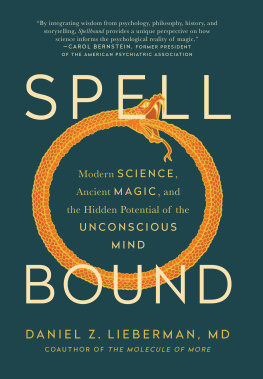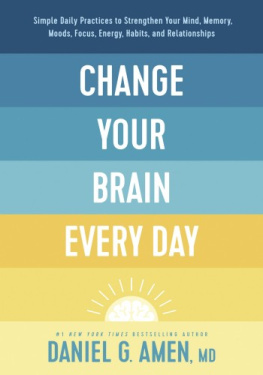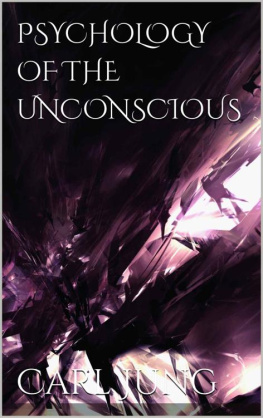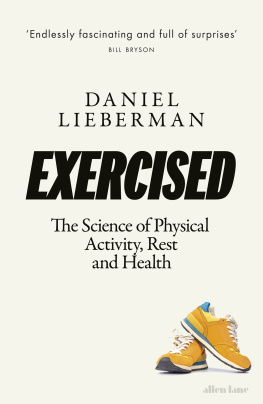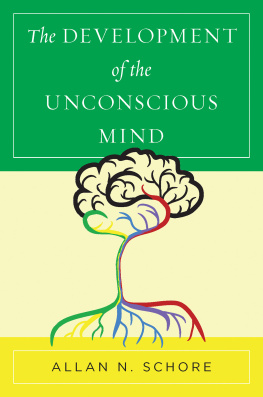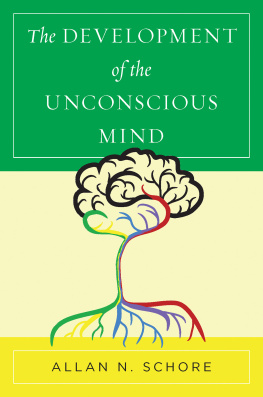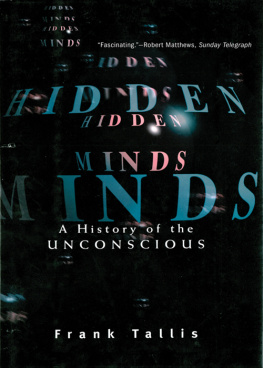Contents
Guide
PRAISE FOR SPELL BOUND
By integrating wisdom from psychology, philosophy, history, and storytelling, Spellbound provides a unique perspective on how science informs the psychological reality of magic.
CAROL BERNSTEIN, FORMER AMERICAN PSYCHIATRIC ASSOCIATION PRESIDENT
We all love stories. In Spellbound, Dr. Daniel Lieberman beautifully weaves together stories from literature, philosophy, spirituality, mythology, and history with neuroscience and Jungian and Freudian psychology. Using clear, jargon-free language, he helps us understand how integrating the magical, mysterious, and metaphorical language of the unconscious, with our rational, orderly, and logical conscious minds, can help us to develop our true selves.
DEBORAH L. FELDHEIM, M.D., PAST PRESIDENT OF THE WASHINGTON BALTIMORE CENTER FOR PSYCHOANALYSIS
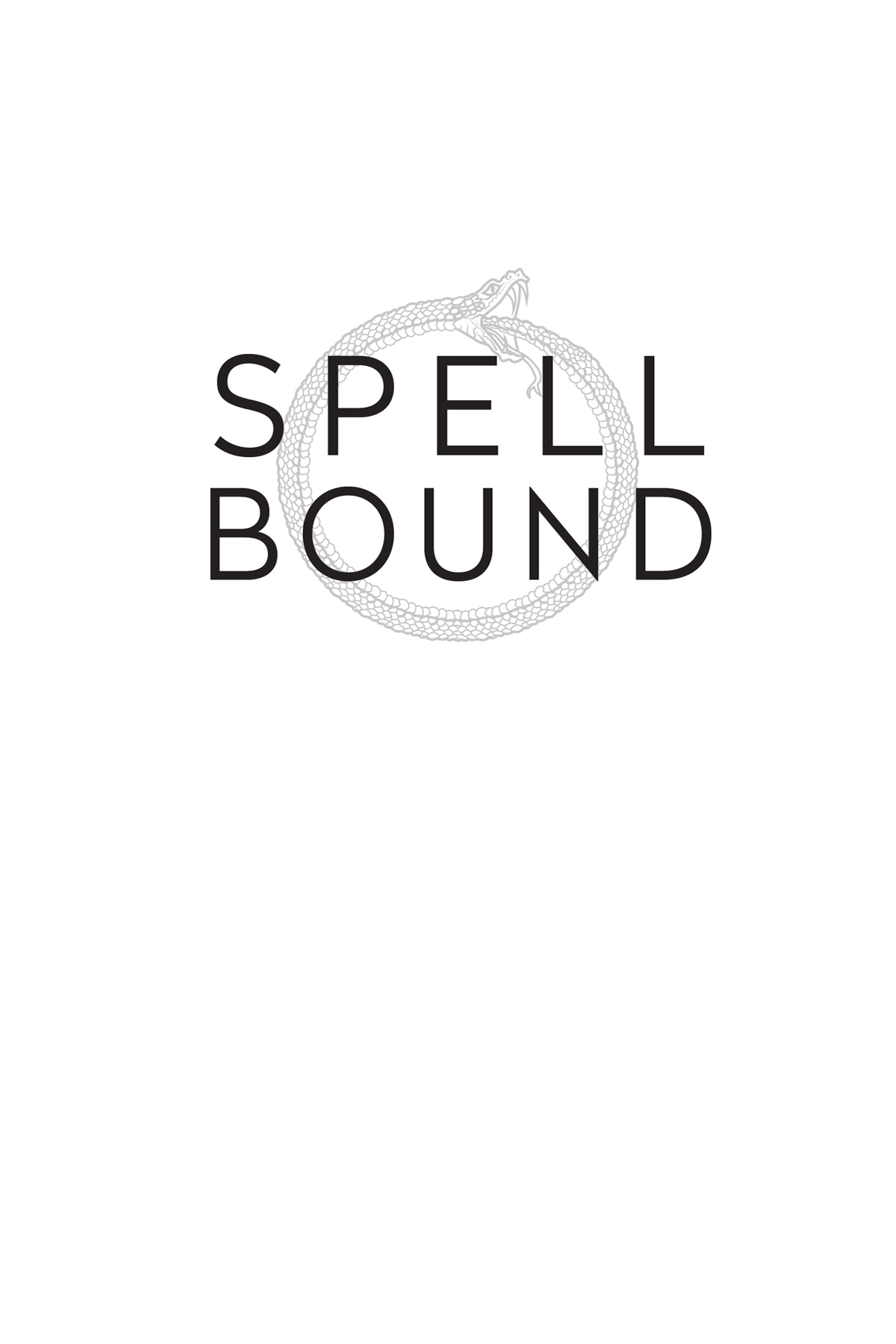
ALSO BY DANIEL Z. LIEBERMAN, MD
The Molecule of More
(coauthored with Michael E. Long)

Modern Science, Ancient Magic, and the Hidden Potential of the Unconscious Mind
DANIEL Z. LIEBERMAN, MD

BenBella Books, Inc.
Dallas, TX
Spellbound copyright 2022 by Daniel Z. Lieberman
All rights reserved. No part of this book may be used or reproduced in any manner whatsoever without written permission of the publisher, except in the case of brief quotations embodied in critical articles or reviews.

BenBella Books, Inc.
10440 N. Central Expressway
Suite 800
Dallas, TX 75231
benbellabooks.com
Send feedback to
BenBella is a federally registered trademark.
First E-Book Edition: August 2022
Library of Congress Control Number: 2022935025
ISBN 9781637741320 (hardcover)
ISBN 9781637741337 (electronic)
Editing by Leah Wilson
Copyediting by James Fraleigh
Proofreading by Marissa Wold Uhina and Amy Zarkos Indexing by WordCo
Text design and composition by Aaron Edmiston
Cover design by Sarah Avinger
Cover image Shutterstock / Kristina Vor
Special discounts for bulk sales are available. Please contact .
For St. Johns College,
where the books of magic are read
CONTENTS
Know thyself.
Inscription on the Temple of Apollo at Delphi
T heres someone living in your head besides you.
You think youre calling all the shotsthat youre in charge of your thoughts, feelings, and choices. Youre not.
When it comes to how you think and feel your way through life, at best youre the copilot. At worst, youre along for the ride, at the mercy of a part of your brain thats overwhelmingly powerful but entirely unseen, influential but utterly secret from you.
Its called the unconscious: a vast collection of neural circuits working all the time, just out of sightjust out of mind. It determines whether you will be enthusiastic or bored, full of energy or barely able to keep your eyes open. It can make you compassionate or fill you with hatred. It chooses what you desire and who you fall in love with. It can solve seemingly impossible problems with the gift of inspiration, and sometimes it possesses you completely, plunging you into an alien world of mystical experience.
What if we could learn how to recognize the influences of the unconscious, and make it an ally in helping us become who we were meant to be?
And what if the key to doing so was not modern science... but a book of fairy tales and a deck of tarot cards?
SCIENCE AND MAGIC
The unconscious has played a prominentthough hiddenrole in human culture throughout history. The ancients sought to understand its influence through myths about supernatural creatures: gods, goddesses, demons, and spirits. This way of thinking has fallen out of favor, but the need to work with our dark twin who accompanies us through life is as important as ever.
Our modern understanding of the mind comes from the disciplines of psychology and neuroscience. Because the brain is so much more complex than other organs, these sciences are still in their infancy, and their explanations work best when it comes to simple behaviors that can be tested in a laboratory. Although it may sound strange, a deeper, more sophisticated understanding of unconscious brain functioning can be obtained by combining these modern scientific discoveries with a psychological understanding gleaned from ancient myths.
Drawing on the work of Swiss psychiatrist Carl Gustav (C. G.) Jung, best known for his theory of the collective unconscious, we can unite science and the supernatural to better understand the hidden part of our minds: to discover how it influences our behavior and how we can join forces with it to enrich our lives and make ourselves whole.
Most people dont think about their unconscious mind very much. In fact, the biggest mistake people make is underestimating its importance. You may have seen pictures that illustrate the mind as an iceberg, with the vast majority (the unconscious) floating beneath the surface. The unconscious uses a much larger part of the brain than the conscious mind, and thats why it has such an oversized influence. Its also more primitive. It has its own way of processing information thats alien to conscious modes of thought.
When the unconscious exerts its influence, it can feel like an external force is acting on us. It can throw us into a passion that takes over our behavior and makes us act in irrational, sometimes self-destructive ways. But it can also awaken latent abilities we never suspected we had. Thats why the unconscious has historically been conceived as a supernatural force. Its both overwhelmingly powerful and utterly alien to conscious modes of thought. One of Jungs most important insights was that the best source of knowledge about the unconscious comes from ancient stories about the supernaturalstories about magic.
Thats not easy to accept. We live in an age of scientific discovery, in which rational investigation into natural processes has banished the superstitions of previous generations in favor of an understanding that gives us unprecedented control over our environment. We no longer need sun gods, tree spirits, or personal demons to explain natural and psychological phenomena. Today, we confidently state that those explanations are of no use to us, because theyre false.
And yet, we remain fascinated by ancient traditions of the supernatural. Some of todays most popular stories are about magic. Enthusiastic audiences pour into theaters to enter the worlds of Harry Potter, Middle-earth, and Marvels superheroes. At first glance it seems odd that magic and the supernatural are still so compelling, long after their descriptions of how the world works have been proven inaccurate. Disproved scientific theories, by contrast, rarely demonstrate this sort of persistence. Few people care about the Rutherford model of the atom, for example. But magic, discredited centuries ago, continues to hold us in its mysterious grip.
Next page
